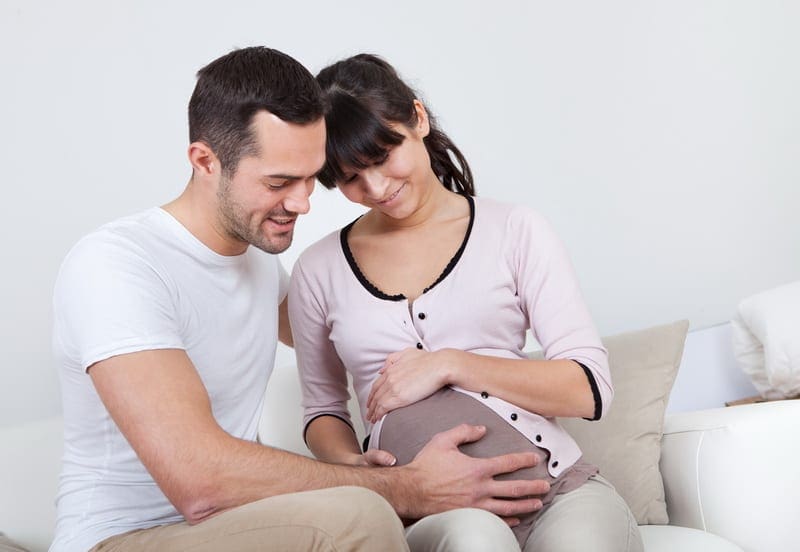Some ladies report that the very first sign of pregnancy for them is a sudden outbreak of acne. Acne in pregnant women seems to start when the egg is fertilized. For these ladies, pimples is the first recognizable symptom of pregnancy. Even women who haven’t dealt with a lot of acne in their lives may suffer from pregnancy acne. This type of pimples typically starts at the beginning of the pregnancy and lasts all the way until the end.
Acne during pregnancy is a common skin complaint. Many women hesitate to use acne treatments during pregnancy, thinking that the little one that is building in their uterus will also experience complications with acne breakouts later in life. However, this assumption has no health basis and is unfounded.
There are a few reasons why females want to know about acne breakouts therapy during pregnancy. First and foremost, it’s important to be cautious about the prescription medications you use during this time, as they can potentially impact your unborn child. Additionally, pregnancy is a time when your body is under a lot of stress, so keeping your skin healthy is important for both you and your baby. Finally, acne can be a source of anxiety and stress during pregnancy, so knowing how to treat it effectively can help you feel more relaxed and comfortable during this special time.
Pimples Causes
There are a lot of things that can contribute to acne breakouts during pregnancy, and one of them is hormonal changes. Progesterone levels can rise and fall, and when they do, it can trigger the oil-producing glands to turn on. This excess oil provides the perfect environment for bacteria to grow and cause skin issues like acne. Fortunately, there are some acne treatments that are safe to use during pregnancy. They’re easy to find and use, so you can get relief from breakouts without worrying about harming your baby.
Pregnancy can cause hormone changes that lead to acne flare-ups. However, once the baby is born and hormone levels return to normal, the acne usually goes away. If your pimples are worsening, speak with your physician about the issue. There are non-medication based therapies for acne, such as facial masks made from fruits or foods, cleansing programs, increased water consumption, and other natural methods. Acne treatments made with organic ingredients can be simple to find online. Some recipes are as easy as heating milk and adding fresh lime juice, then allowing the mixture to cool before using it as a facial acne treatment. If you prefer to avoid using synthetic materials on your face, this sort of acne therapy should be safe for you to use. However, because your concern is both your baby’s health and your own, always talk to your doctor before trying any acne treatment, even those that seem to be natural.
Acne, including the pimples associated with pregnancy, occurs when dead skin cells and bacteria form blockages in the pores. Hormonal surges or other changes to the body are the most likely triggers of this problem, making it most likely to take place during pregnancy or adolescence. During pregnancy, the changes in hormone levels can encourage the production of additional natural oils, which can congest the skin pores and lead to a breakout of pimples.
Many women find that they suffer from acne breakouts during pregnancy. This is due to the hormonal changes that happen in a woman’s body during pregnancy. These hormonal changes can cause inflammation of the skin, which leads to acne breakouts.
Pregnancy can often encourage acne breakouts, but fortunately those symptoms usually go away after the pregnancy ends and hormone levels settle. However, the length of time that pregnancy pimples lasts differs for each woman.
Acne is common among pregnant women, especially during the first trimester. While it’s impossible to predict which women will experience acne during pregnancy, those who have previously had trouble with acne are even more likely to have episodes during pregnancy. The following signs are typically experienced during the early stages of pregnancy:
1) Oily skin
2) Blackheads
3) Whiteheads
4) Red areas
5) Distressing and inflamed pustules as well as bumps
It is natural for a pregnant woman to want to take care of her skin, especially if she is dealing with pregnancy pimples. However, it is still important to not neglect the complication and maintain healthy skin. This can be done by cleansing the face twice a day, in the morning and at night. When choosing a facial cleanser, it is important to pick one that is gentle enough for sensitive skin. The best choice is usually a fragrance-free facial cleanser with moderate ingredients.
If the anxiety of pregnancy wasn’t enough, pimples can join the ride to deliver even more stress to the process. Discovering a safe and efficient treatment for pregnancy acne is not always an easy task. The months leading up to birth are when hormone levels rise, which can result in many changes to the skin – including acne.
Many pregnant mothers-to-be elect for natural home remedies as their more secure selection for acne breakouts therapy or they pick an item with all natural ingredients. Nevertheless, it is essential that you do not begin usage of these home or natural treatments without consulting with the doctor concerning their safety first. Some all-natural herbs were once utilized to generate contractions, so merely because the product label says all natural does not mean the therapy is risk-free for usage during pregnancy.
While some women may feel more comfortable avoiding any type of acne treatment while pregnant, this may not be the best decision. If acne gets out of control, it can lead to infection, which could endanger the baby.
Squeezing pimples, no matter what kind, is never a good idea. This is especially true for pregnant women who suffer from acne. Additionally, it’s important to avoid touching your face as much as possible. Oftentimes, the best acne treatment is simply living a healthy lifestyle and not picking at your acne.
Do not give up hope for enhancement, as pregnancy acne breakouts will inevitably go away. However, the hormones may kick in once again, inducing more acne issues in the future. Some girls see a rise in acne breakouts during the menstrual durations. Others could experience acne breakouts when pregnant and also once more when experiencing menopause.
There are a few things that you can do to help get rid of pregnancy pimples. First, try to relieve some of the stress and tension that you may be feeling. This can be done by getting plenty of rest and relaxation. Also, try to eat a balanced diet so that your body has the nutrients it needs to fight off any hormonal imbalances.
Over the Counter Acne breakouts Remedies
Before using any kind of over the counter treatment during pregnancy, check the ingredients list and avoid anything that could be harmful to the baby.
Before choosing any kind of skincare product to use during pregnancy, it is important to seek the advice of a dermatologist. This is especially essential if you are using a product that contains chemicals or other synthetic ingredients.
Any sort of medication treatment for adult acne breakouts may cause unfavorable adverse effects, making it important to look into any type of medicine for pimples prior to usage. It’s also important to keep in mind that even particular medications can easily be absorbed through the skin and passed through the placenta to the expected child. All therapy for skin problem such as acne breakouts need to be monitored by a medical doctor as some treatments can easily generate problems throughout pregnancy or trigger birth problems. Pimples throughout pregnancy is common. Changes in the bodily hormone levels in the expectant girl’s body typically induce the acne breakouts and it typically goes away once the little one is born as well as hormone degrees return to normal.
Although benzoyl peroxide is often considered a safe treatment for acne during pregnancy,women should always consult their doctor before using any medication. Avoid medications that contain salicylic acid, such as Stridex and Propa pH. Topical treatments that are applied to the affected area can also enter the bloodstream and impact the baby, so it is important to consult with a doctor before using any of these products.
Expecting women may be able to find relief from first trimester pimples with over the counter treatments. Medications like azelic acid and benzoyl peroxide are generally considered safe for both mother and child. Dental treatments for acne, with the exception of erythromycin, should be avoided during pregnancy. As always, it’s best to check with your doctor before beginning any medication regimen.
There are many options for treating pimples during pregnancy. Benzoyl peroxide and other products are typically recommended by doctors for acne treatment during pregnancy. However, you should always consult with your doctor before starting any acne treatment. Some treatments, such as those containing salicylic acid, should be avoided during pregnancy. Better options that are recommended by dermatologists and other physicians include benzoyl peroxide products, which can effectively treat acne without harming the mother or child. However, benzoyl peroxide treatment can take some time to work and results may not be immediately visible.
It’s not always necessary to use acne therapy when pregnant, but it can offer benefits to pregnant women who must deal with episodes. Use of any treatment is a personal choice that should be made with vigilance. Remember that many prescribed medications and solutions bought over the counter could pose a risk to your unborn child. Mild acne usually responds to specific applications of acne pastes and spot treatments. Severe cases might require oral medications prescribed by a dermatologist.
Residence Treatments
When it comes to home therapies for acne, many females feel a lot less concern when expectant. As an example, many girls decide on lavender oil, which is known to be a reliable item for usage on the skin affected by pimples. This electrical anti-oxidant helps with several kinds of skin complications. The oil is mild for the skin without any type of adverse effects. Belladona is a dental supplement that is effective when acne breakouts are developing pus.
Hepar Sulfur can be used to target big, distressing cysts. This type of acne can easily induce marks unless harsh care is utilized. Flower oil is an important oil that is often practical for pregnancy acne. Witch hazel, an astringent, is readily available in shops. In addition, Kali Bromatum can be helpful for annoying imperfections.
There are numerous household items and herbs that can be significantly effective in reducing acne breakouts, particularly when they are due to hormonal discrepancies that occur during pregnancy. However, pregnant women need to be careful when using these remedies, as some of them may cause contractions. Just because a remedy is natural does not mean it is automatically safe for use during pregnancy.
Medical Treatments
Although topical retinoids like tretinoin and adapalene are newer acne treatments, there is currently insufficient data on their safety for pregnant women. Until more information is available, expectant mothers should avoid using these products, according to manufacturer health care literature.
Accutane and Isotretinoin are two of the most common treatments for cystic acne. Both are essentially a very high dose of Vitamin A. However, these treatments come with a host of possible side effects, some of which can be quite extreme. For this reason, these treatments should only be administered under the guidance of a doctor. They can take several weeks or even months to show any visible results. Additionally, this treatment should not be used by pregnant women or women who are trying to become pregnant, as it can lead to abortion or birth defects. Women who suffer from cystic acne after pregnancy often see an improvement when they use this pill.
Pregnant women need to be aware that even some creams used for acne treatment can be harmful. Though topical skin creams and lotions are not as dangerous as oral prescriptions, they can still pose possible hazards to the developing baby. Pregnant women should evaluate all the information before deciding to use any medication.











